Composer Kamran Ince
A Conversation with Bruce Duffie
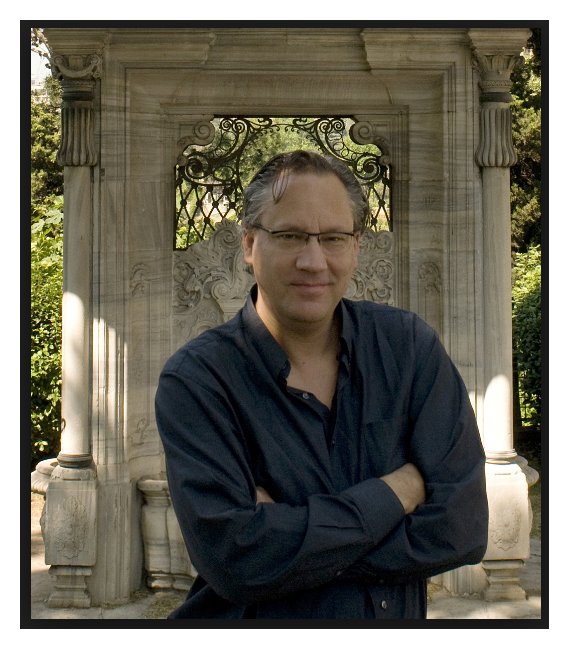
Kamran Ince was born in Montana
in 1960 to American and Turkish parents. He holds a Doctorate from
Eastman School of Music, and currently serves as Professor of
Composition at University of Memphis and Co-Director of MIAM (Center
for Advanced Research in Music) at the Istanbul Technical University.
The leading orchestras of the world perform his works. Concerts devoted
to his music have recently been heard at the Holland Festival, CBC
Encounter Series (Toronto), the Istanbul International Music Festival,
Estoril Festival (Lisbon), TurkFest (London), and Cultural Influences
in Globalization Festival (Ho Chi Minh City). In addition to symphonic
and chamber works, his catalogue also includes music for film and
ballet. His numerous prizes include the Prix de Rome, the Guggenheim
Fellowship, and the Lili Boulanger Prize. His Waves of Talya was named
one of the best chamber works of the 20th Century by a living composer
in the Chamber Music Magazine.
His music is published by Schott Music
Corporation.
|
In October of 1989, Kamran Ince was not quite thirty. He was
having his work Before Infrared
played by the Chicago Symphony Orchestra on one of its regular
subscriptions series. Surrounded by music of Mozart (Piano Concerto #21) and Falla (Nights in the Gardens of Spain)
with Alicia De Larrocha, and La Mer
of Debussy, it stood its own and was warmly received. David
Zinman conducted.
Besides what is shown in the box above, he studied with (among others)
Joseph Schwantner, Christopher Rouse, Samuel Adler, and Barbara
Kolb. [See my Interview with
Joseph Schwantner, my Interview with
Christopher Rouse, and my Interview with Samuel
Adler.] Now, a quarter-century later, Ince has lived up to
his promise, and taken his place in the group of composers whose works
are regularly performed and recorded.
We met for the interview at the end of a long day, and while he was
perfectly willing to chat, he was tired and mentioned that as we began
. . . . . . .
Kamran Ince:
I’m not that vibrant. I’m
kind of tired.
Bruce Duffie:
Is your music at all tired, or is your
music always vibrant?
KI:
[Laughs] It’s very seldom tired, I would
say. It’s mostly vibrant. But my music from three or four
years ago was much more vibrant. I’ve just finished a septet for
this ensemble in New York. They’re going to play it next month,
and it’s very laid back and very quiet, but yet, it’s contrasted by
incredible outbursts of energetic and odd-sounding stuff. This
summer I was listening to Ennio Morricone, the film composer, a
lot. I was affected by
these very simple, twisted Italian melodies. So in this latest
piece I was going for something kind of simple, effortless, and kind of
timeless. It sounds so grand.
BD: How does
someone who is merely twenty-nine years
old get a piece played by the Chicago Symphony Orchestra?
KI: Well, if
a conductor wants to do a piece, and if
the circumstances work out, then he’ll take it to
where he wants to perform it. Zinman wanted to do it.
Actually he was going to do it in Baltimore last year, but they were
on strike, so he’s doing it here and then next year in Baltimore and
then New York.
BD: So he
must have heard your music before
this, and believed in you?
KI: Yes, he
did hear my music. He
knows my music.
BD: Is this
what a composer has to do
— find a conductor who will champion
the music?
KI: Oh, it
definitely helps, yes. Definitely
helps, undoubtedly.
BD: Was this
piece on commission, or is this a
piece you wrote and submitted?
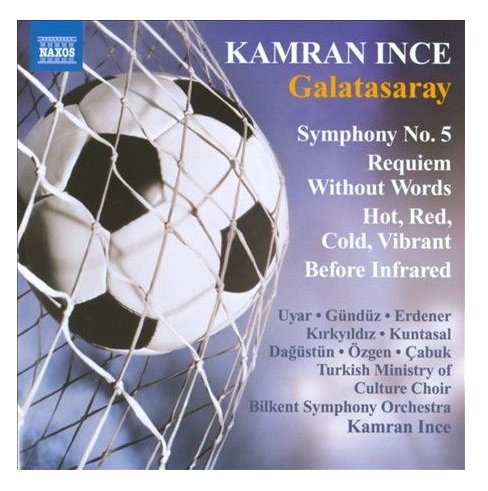 KI: Actually, no. I
had written another piece called Infrared
Only that was for a
commission for the New York Youth Symphony. I wrote it when I was
twenty-five, and it was done in New York when I
was twenty-six. It’s a very energetic
piece with high action, and I wanted to write a second piece
that will somehow take me to that piece. This way they can go
together. It’s a twenty-minute work, or they can be played
separately, as Infrared Only
and Before Infrared.
KI: Actually, no. I
had written another piece called Infrared
Only that was for a
commission for the New York Youth Symphony. I wrote it when I was
twenty-five, and it was done in New York when I
was twenty-six. It’s a very energetic
piece with high action, and I wanted to write a second piece
that will somehow take me to that piece. This way they can go
together. It’s a twenty-minute work, or they can be played
separately, as Infrared Only
and Before Infrared.
BD: You’re
not going to
write third piece and make it a trilogy?
KI: No.
But so far they have
been played separately. Actually, the Brooklyn Philharmonic will
play it together, maybe next year or a year later. They’re
supposed to, anyway.
BD: Let me
get a little background about you. I
assume you didn’t start out
composing. You probably started out playing an instrument?
KI:
Yes. I started out with cello when I was
about ten.
BD: When did
you decide that you wanted to be a
creator rather than a re-creator?
KI: Before
that I was playing the
mandolin. This was in Turkey, in Ankara. I like
to improvise. I was a kid and I didn’t know
what I was doing. But then I started playing cello, and my father
saw that I was improvising so he
encouraged me. Then I started doing a little bit more and
developed
that way.
BD: You then
studied back here in the
United States?
KI:
Yes. I actually started in
Turkey. I went to the conservatory after elementary school.
That’s how the system works there. Then you go through
university, and when I was in university I transferred to
Oberlin. I finished there and then I went to Eastman School
of Music where I got my doctorate two years ago.
BD: When
you’re sitting down to write a piece,
are you at the stage yet where everything is under your control, or are
there still times when that pencil really is controlling your
hand and you follow it?
KI: No, I am
in control. Actually, that
problem sometimes exists for composers. When they compose at the
piano, then they write where their fingers take
them. But I have total control. Sometimes you
get so passionate that you may not think about things too much and do
something more intuitive. I like to do it
intuitively. I like to compose. I believe in
intuition and passion.
BD: Are you
ever surprised where your
composition winds up?
KI: How do
you mean?
BD: When you
start writing, do you know how it’s
going to sound when you get to
the end?
KI: In some
cases I know a
general shape, and in other cases, no. I start out with a
striking idea from myself, and then that kind of takes me,
and I discover as I go along. That’s the exciting thing for
me most of the time, because if I knew what was going to happen, it
would be boring for me to spend all those hours.
This way I can go to bed and wake up still thinking about it.
BD: Is the
act of composing something
that is laborious?
KI:
Sometimes, it can be, yes. Sometimes
you may not necessarily want to, but you must create every day for
three or four hours. That’s what I
do. I guess some people can create for seven
or eight hours, but that’s my limit pretty much, four hours or
so. But every day you must do it
because you’re working with deadlines. That’s your work; you must
do it every
day. Sometimes you are very excited, and other days you
may not be as excited, but you know you have to work. But yet,
what comes out might still be even more exciting, even if you weren’t
excited while doing it. [Laughs]
BD: You spend
every day
composing. Do you have any other form of employment, or are you
living on your commissions?
KI: Yes, I’m
living on my grants and
commissions, etcetera.
BD: I assume
you are getting
enough of them, then, to hold body and soul together?
KI: For the
time being, yes.
BD: Are you
getting, perhaps, too many, so that you
turn
some down?
KI: No, no.
BD: So
anything that comes to you, you
will accept?
KI: Oh,
yes! I do.
BD: If
someone comes to you with a commission for
a trio for piccolo, ocarina, and tuba, you will do it?
KI: Uh!
[Laughs] If they pay a lot of
money, yes, I’ll do it.
BD:
Really??? You’d be able to crank your
musical mind into a
mode that you’re not familiar with, or not even enthusiastic about?
KI: Maybe
there’s something. Maybe there’s
something to pairing the piccolo and tuba that I don’t know.
BD: [With a
gentle nudge] Don’t
forget the ocarina!
KI: What is
that instrument? I don’t know it.
BD:
[Surprised] Oh! So you’d have to
learn a little
bit. It’s like a sweet potato with holes in it.
KI: [Laughs]
Oh, okay. Well yes, I think I
would even do that! Sure. I don’t think even money
is important. I think I will do it if I have the
time, and if I can fit it in somewhere.
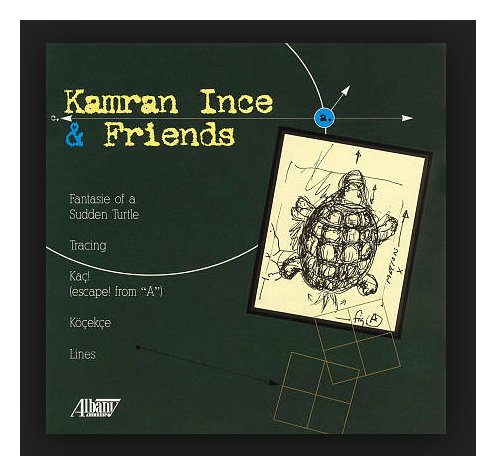 BD: When you get a commission,
do you know in
advance about how long it will take to complete the work?
BD: When you get a commission,
do you know in
advance about how long it will take to complete the work?
KI: I have an
idea. The more you write
commissioned pieces, the more you know how long it takes you to write
them. But coming back to the money point, sometimes
something that I really like may not involve much money, and
I’ll do it because I really like it.
BD: In your
young career, have you already written for all forms
— chamber, symphony, band, etcetera?
KI:
Yes. Well no, I haven’t written for
bands.
BD: String
quartet?
KI: When I
was fourteen or fifteen I wrote for string
quartet, but that was obviously a learning piece. I have written
for orchestra, chamber, piano, two instruments, piano and
something else, etcetera.
BD: Does it
help if you play the instrument yourself,
to get some better ideas or compositional techniques needed on the
paper?
KI: No, not
at all. Actually,
sometimes it’s better that you not play the instrument because you’re
not as conditioned to think in certain ways. When you were
learning on an instrument you don’t take chances necessarily, but with
an instrument you don’t know, you take more
chances. Writing for the orchestra and for all these
different ensembles, you develop a knowledge for all the instruments,
really. You know what they can do and what they can’t do,
and what they’re best at.
BD: Are you
mostly concerned with simply the
end product, the sound that comes out? Is that really all that
concerns you, rather than the technique of producing that sound?
KI: You mean
whether I’m more concerned with the
process or the result?
BD: Mm-hm.
KI: Of
course, the result. I don’t care what
the process is.
BD: You don’t
care if the cello player stands on his
head, and then bows the back of the instrument?
KI: Oh,
no! I wouldn’t ask them to do awkward
things. I don’t believe in that.
I thought you were talking musically.
BD: Even if
it produces just the sound you want?
KI: Standing
on the head? What kind of sound
would that be?
BD: I have no
idea, but you’re the composer.
[Both laugh] I’m creating a few hypothetical
situations.
KI: Like for
instance going into the piano you can
get great sounds, and yes, I’ve used that many times.
BD: I’m
looking for the compositional process, which
is hard to pin down.
KI:
Yes. As I said, I start with an idea,
and then I develop from there. You
must work every day, but sometimes when I have the
time, I say I cannot work. I must somehow re-group, come back and
view what I was doing from an independent point of view after a couple
of days passed. Then,
maybe, whatever was going to come
after or how I was going to develop the idea has ripened in my
mind. Then I’ll go back to
it. There’s times like that, too. There’s even times where
I find it
very useful not to compose for, let’s say, a month.
BD: To clear
your mind?
KI: Oh yes,
because a
lot of times you get into a routine. You are able to pull back
and look at it, but sometimes you need more time to pull back and
refresh what you are and regroup
that creative power. Maybe every two years I find myself needing
to rest for a month.
BD: When
you’re working on a piece
and you get all of the notes down and you’re polishing and you’re
tinkering, how do you know when to put the pencil down
and say, “It is finished. It is ready to go.”?
KI: I don’t
do any sketches. What I write down,
that’s the
last score on the paper because I don’t like to copy afterwards,
either. I work with a very dark pencil, so whatever I write down
is permanent for the time being, and if I want to
change it, I can go back and totally erase it.
BD: So you
try to get it complete in
your mind before it goes on the paper?
KI: Yes, I
do. Sometimes it works very
well, and sometimes I must later on come back and insert things or
take out things or maybe erase totally.
BD: Do you
ever go back and revise a score once it’s
been played?
KI: No, I
haven’t really done that. Sometimes
if it’s chamber music and you know the group pretty
well — or
even if you don’t know them and they perform it for the first
time — you
see that some things don’t work. Right on the spot
as they’re rehearsing you say, “Okay, why don’t you try this, or try
that, or do this?” If those work, then yes, I go back and change
them after the performance. Also with tempos
that’s very possible, too.
BD: Are there
ever times when the
performers find things in your score that you didn’t know were there
— little hidden brilliances or
something like that?
KI: Well, not
really hidden
brilliances, but more like hidden feelings that I may not have
felt. Sometimes that
happens. I was talking to John Corigliano the other
day in the ballroom here at Orchestra Hall, and he analyzed this piece
and then came out with some things. [Note: Corigliano was at that
time Composer-in-Residence with the Chicago Symphony Orchestra.
See my Interviews
with John Corigliano.] For instance, apparently
the piece starts with one
note and then slowly other notes get added. Apparently I
used eleven notes and don’t use the twelfth note. When the
melody comes in, then I use the twelfth note in the bass. This is
something I hadn’t thought of.
BD: So you
don’t work
from theory; the theory comes afterward?
KI:
Exactly. When I was
doing my masters, I had to write a thesis on my piano concerto, and I
found things that I could not believe. They were really
incredible!
BD: Good
things or bad things?
KI: Very good
things. I couldn’t believe how
everything
clicked, and how everything made sense. Corigliano was saying
that he did the same thing with
a piece of his, and the same thing happened.
BD: So it’s
more intuition
than technique?
KI:
Yes. My intuition is translated through my
technique onto the
paper. I don’t say before I sit down, “Okay, I’ll
use these, these, these, these pitches, and then I will never use these
pitches,” or, “I’ll use this rhythm
strictly, and then I’ll mathematically permutate that and do
things.” I don’t work that way, but some composers do. I
don’t like
that. It’s not exciting for me.
BD: Composing
the way you compose is
exciting for you?
KI:
Yes. It is exciting, yes.
*
* *
* *
BD: Let me
ask the great, big philosophical
question. What is the purpose of music in society?
KI: Maybe it
is to take them to
places that we cannot explain or to make them feel
things that we cannot put our fingers on, such as emotions. Music
can whip so many things in me and I’m sure in
other people, too — places,
times, memories, déjà
vus, unexplainable moods, joy, happiness, excitement, that
secret world.
 BD: Is it your secret world
that we
are going into, or are you taking us into the secret world?
BD: Is it your secret world
that we
are going into, or are you taking us into the secret world?
KI: No, it is
my
world. Of course it’s probably part of the
secret world, but it’s my world. Every
composer’s world, every individual’s world, is part of the whole
world.
BD: Do you
feel that you are part of a lineage
of composers stretching back through the centuries?
KI: Oh,
sure. Oh, sure, definitely!
Yes. Yes. Yes. [Laughs]
BD: Are you
pleased with the way this
particular piece is sounding with this particular orchestra?
KI: Yes, very
much so, because there’s a
lot of brass and there’s a lot of bright woodwinds.
BD: If you
get a commission for a
group that is not technically so proficient, would you write something
that is moving but yet technically easier?
KI: Oh, yes,
sure! But I am very
pleased with the performance here. David Zinman is doing a super
job. He’s great. He’s so precise.
BD: You’ve
got several commissions that you’re working on now.
How far ahead are the deadlines that you’ve already agreed?
KI: Maybe
middle of ‘91.
BD: Is that a
good feeling to know that in the
middle of ‘91 you’ll have this piece completed and hear it performed?
KI:
Yes. It will be a good feeling if I’m
really pleased with the
piece, which I hope to be.
BD: Is there
ever a case where you get part way in
the piece and decide it’s no good and just scrap it?
KI: No.
I never felt that
way, but if I did feel that way, I would do it, I think. On
the other hand, you go through periods with every piece, and afterwards
you’re not necessarily terribly
impressed by it as when you were writing it. But that’s true
about all art work. After some time passes you reconsider.
Then with some pieces you’re much more pleased
and you’re really proud of them, and some pieces you’re not as
much. Maybe that’s exciting, too.
BD: What do
you expect of the audience
that comes to hear a piece of yours?
KI: I would
like the audience to be
involved with every measure of the music, and be somehow moved or not
moved. I hope they have some kind of reaction to every measure of
the music. I my music I would like to keep the attention of the
audience at every moment, and somehow grab them with that world
and take them through it, and then let them breathe only at the
end.
BD: Is it
supposed to be an artistic
enrichment, or is it supposed to be entertaining?
KI:
Definitely artistic enrichment, but they’re
entertained in the process, which I’m sure they will be if it’s an
artistic enrichment.
BD: Where is
this delicate balance between the art
and the entertainment?
KI: Who
knows? Obviously there’s
some entertainment and artistic enrichment in all classical
music. One would think that if they’re entertained, if they
really like the piece, they’re enriched. They’ve gone into this
world, and I
have made them think things they may not have thought and felt
before. Would you call that entertainment? It would be, I
guess.
*
* *
* *
BD: You’re an
American, or you’re Turkish, or
what?
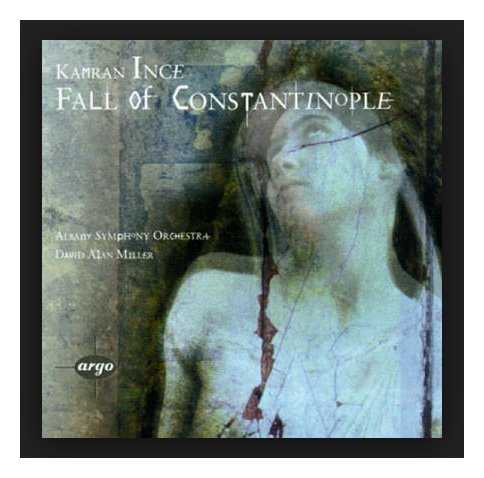 KI: I’m both. My mother’s
American and my father’s Turkish. I live half my life there and
half
my life here. I’m living in America, so I’m an
American.
KI: I’m both. My mother’s
American and my father’s Turkish. I live half my life there and
half
my life here. I’m living in America, so I’m an
American.
BD: Is there
anything particularly Turkish that wends
its way through your music?
KI: No.
Subconsciously I have an
affinity for contrasts, so that comes from not only Turkish music, but
this bi-cultural-ness that I am, having been
exposed to two drastically different cultures.
BD: Is it at
all difficult to put these two
drastically different cultures together?
KI: I’ve been
coping with that within myself all my
life within myself, not just in my music. Actually it gives
me an advantage, and an edge to my music,
probably. But as far as my personality and my inner worlds, I’ve
finally come in terms with that. I’m
bi-cultural and I’m finally comfortable with that. But
also I lived a year in Italy, in Rome, which was a very odd
thing. I had the Prix de Rome, the Rome Prize, and that was very
hard. I was born here in America, and I left to go to Turkey when
I
was
seven. When I got there, all the kids made fun of me. They
called me ‘the
American’.
I went to
school and felt comfortable, then I came back here when I was
twenty.
BD: Then here
you were ‘the
Turk’?
KI: For a
while, yes, and I couldn’t adjust.
Then finally I did, and finally I felt at home in America. I
liked everything about it. Then I went to Italy for a year.
I was mostly an
American in Italy, but somehow, being in Europe I was close to Turkey
there. I felt like I was no one,
basically, because a year is a kind of odd time. Are you a
tourist? Are you Italian? What are you? You
don’t speak the language well. By the time you get used to it,
you leave. Then I came back to America, and now,
finally, I think I’m back into feeling and being very comfortable as an
American.
BD: Let me
take you back to Turkey just for a
minute. What is the cultural life like in Ankara?
KI: I was
also in Izmir,
too. Ankara is the capital. It’s very organized. They
have a good orchestra. They have opera. They have great
theaters. Theater is something very strong in Turkey.
BD: Is the
opera done in Turkish, or in the language
that it’s written?
KI: Mostly in
Turkish, unless it’s
in Italian.
BD: Is
Italian close to the Turkish language?
KI: Not at
all. I guess they want to please the
singers or
something like that. [Laughs] In Ankara there are all the
embassies and everything. My mother’s American, so we spoke two
languages at home. But life is not bad in
Ankara.
BD: Thank you
so much for coming to Chicago and for
speaking with me.
KI:
Yes. Great, great. You do a great
job!
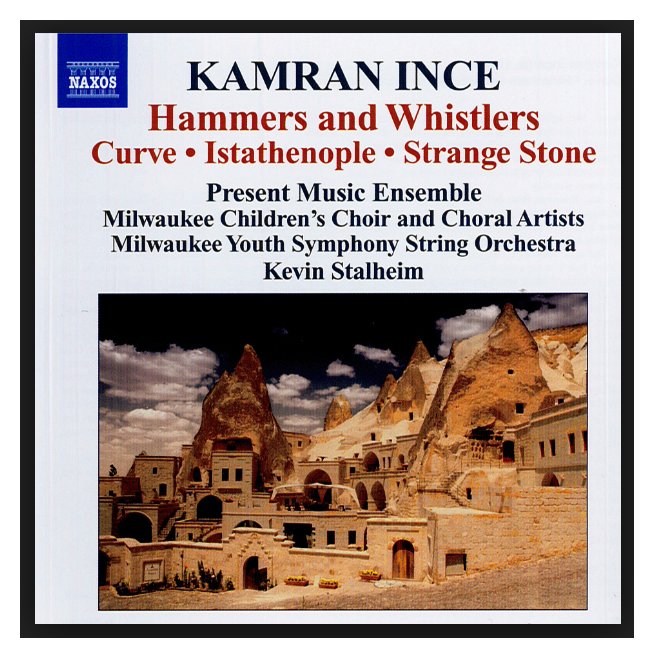
© 1989 Bruce Duffie
This conversation was recorded in Chicago on October 13,
1989. Portions were broadcast on WNIB the following
year,
and again in 1995 and 2000; on WNUR in 2009 and 2010, and on
Contemporary Classical Internet Radio in 2009.
This transcription was made in 2014, and posted on this
website
at that time.
To see a full list (with links) of interviews which have been
transcribed and posted on this website, click here.
Award
- winning
broadcaster
Bruce Duffie was with WNIB, Classical 97 in Chicago from 1975
until
its final moment as a classical station in February of 2001. His
interviews have also appeared in various magazines and journals since
1980,
and he now continues his broadcast series on WNUR-FM, as well
as
on Contemporary Classical Internet Radio.
You are invited to visit his website
for more information about his work, including selected transcripts of
other interviews, plus a full list of his guests. He would also
like
to call your attention to the photos and information about his
grandfather, who was a pioneer in the automotive field more than a
century ago. You may also send him E-Mail
with comments, questions and suggestions.


 KI: Actually, no. I
had written another piece called Infrared
Only that was for a
commission for the New York Youth Symphony. I wrote it when I was
twenty-five, and it was done in New York when I
was twenty-six. It’s a very energetic
piece with high action, and I wanted to write a second piece
that will somehow take me to that piece. This way they can go
together. It’s a twenty-minute work, or they can be played
separately, as Infrared Only
and Before Infrared.
KI: Actually, no. I
had written another piece called Infrared
Only that was for a
commission for the New York Youth Symphony. I wrote it when I was
twenty-five, and it was done in New York when I
was twenty-six. It’s a very energetic
piece with high action, and I wanted to write a second piece
that will somehow take me to that piece. This way they can go
together. It’s a twenty-minute work, or they can be played
separately, as Infrared Only
and Before Infrared.  BD: When you get a commission,
do you know in
advance about how long it will take to complete the work?
BD: When you get a commission,
do you know in
advance about how long it will take to complete the work? BD: Is it your secret world
that we
are going into, or are you taking us into the secret world?
BD: Is it your secret world
that we
are going into, or are you taking us into the secret world? KI: I’m both. My mother’s
American and my father’s Turkish. I live half my life there and
half
my life here. I’m living in America, so I’m an
American.
KI: I’m both. My mother’s
American and my father’s Turkish. I live half my life there and
half
my life here. I’m living in America, so I’m an
American.